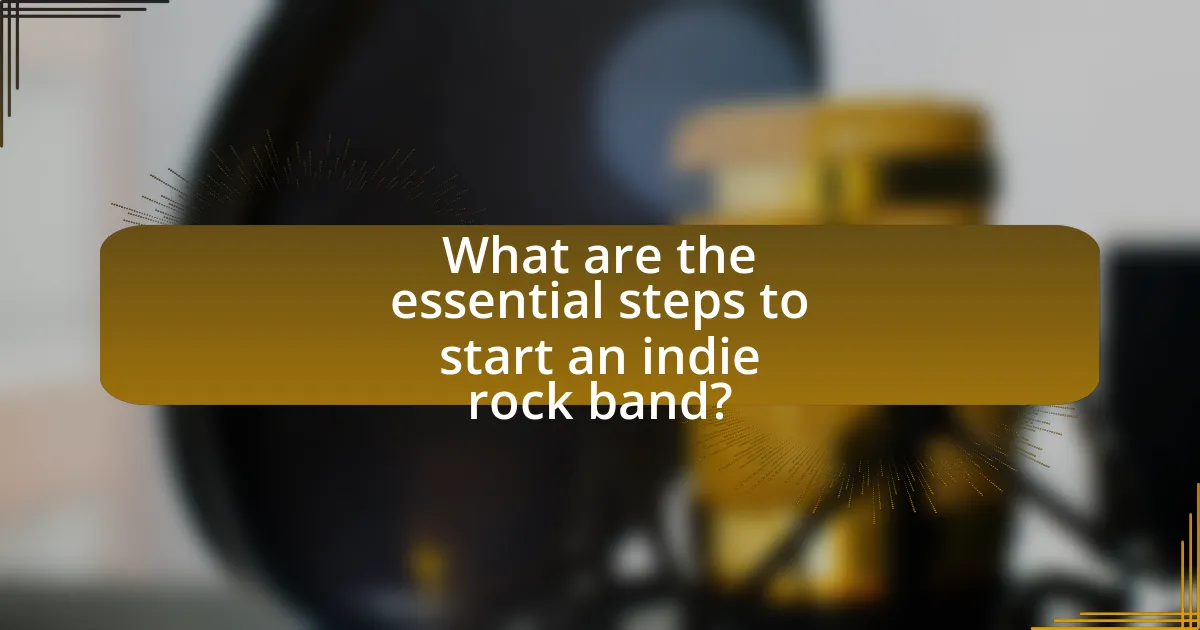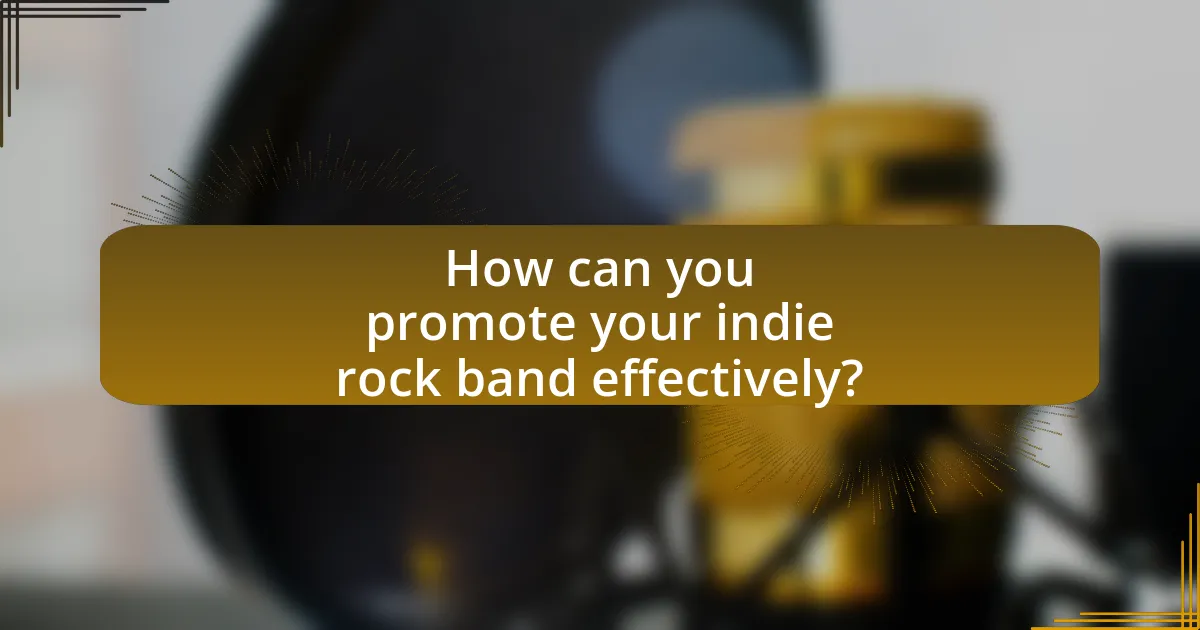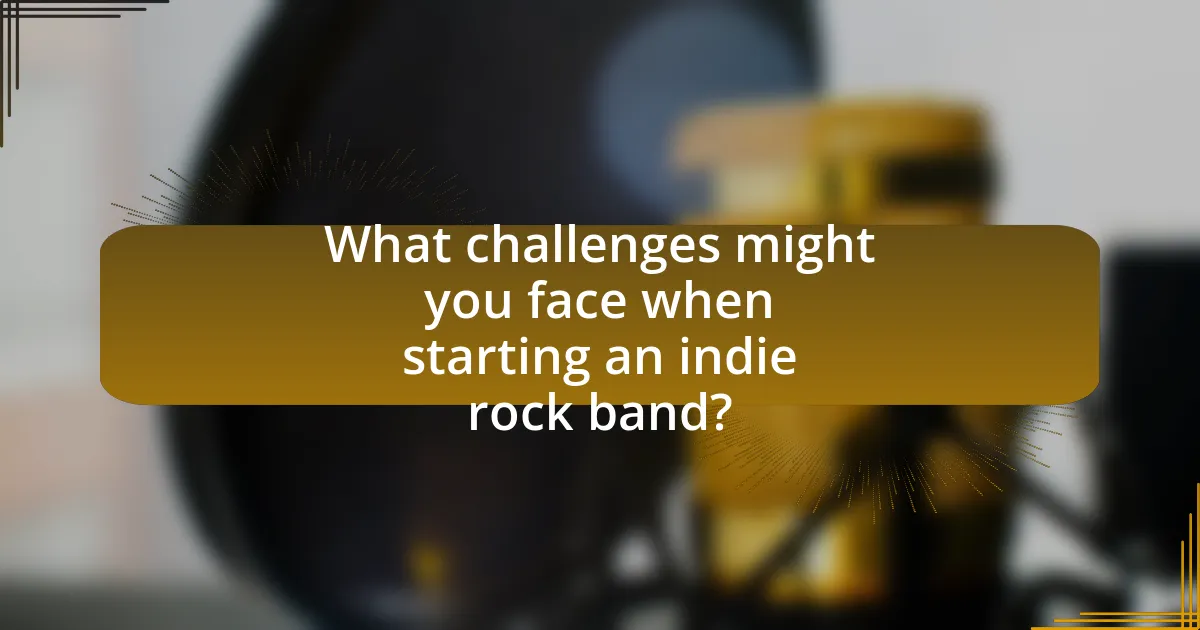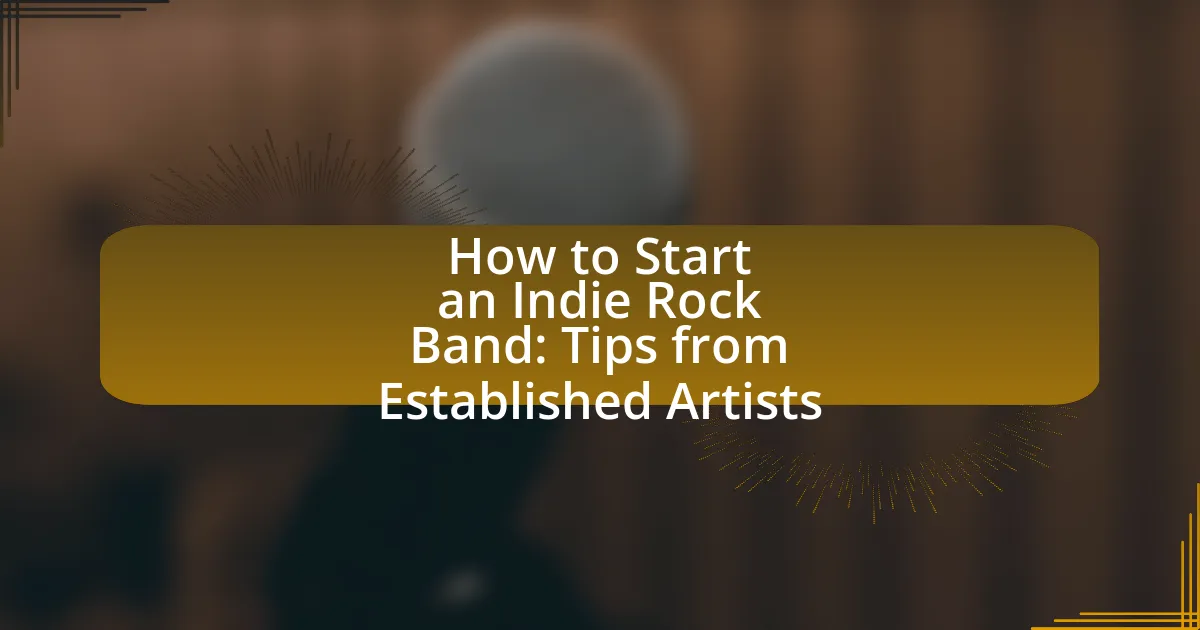The article provides a comprehensive guide on how to start an indie rock band, detailing essential steps such as forming a group, defining the band’s sound, writing original music, and promoting through social media and live performances. It emphasizes the importance of finding compatible band members, effective auditioning, and collaborative songwriting to establish a unique identity. Additionally, the article discusses strategies for promoting the band, building a fanbase, and navigating challenges like financial constraints and creative differences. Practical tips from established artists are included to help newcomers stay motivated and focused on their goals in the competitive music industry.

What are the essential steps to start an indie rock band?
To start an indie rock band, the essential steps include forming a group of musicians, defining the band’s sound and style, writing original music, rehearsing regularly, and promoting the band through social media and live performances. Forming a group typically involves finding members who share similar musical interests and goals. Defining the band’s sound is crucial, as it helps in creating a unique identity that resonates with audiences. Writing original music allows the band to showcase its creativity and establish a repertoire. Regular rehearsals ensure that the band tightens its performance and develops chemistry. Finally, promoting the band effectively through platforms like Instagram, Facebook, and live gigs is vital for gaining visibility and attracting fans.
How do you find the right band members?
To find the right band members, actively seek individuals who share similar musical interests and goals. Networking at local music events, utilizing social media platforms, and joining music forums can help identify potential members who align with your vision. Research indicates that successful bands often consist of members with complementary skills and a shared commitment to the band’s objectives, enhancing collaboration and creativity.
What qualities should you look for in potential bandmates?
When selecting potential bandmates, look for qualities such as musical compatibility, commitment, and good communication skills. Musical compatibility ensures that members share similar tastes and styles, which is crucial for cohesive sound and creativity. Commitment reflects a member’s dedication to rehearsals, performances, and the overall vision of the band, which is essential for long-term success. Good communication skills facilitate collaboration and conflict resolution, fostering a positive working environment. These qualities are supported by the experiences of successful bands, which often emphasize the importance of teamwork and shared goals in their formation and longevity.
How can you effectively audition musicians?
To effectively audition musicians, establish clear criteria for skills, style, and compatibility with your band’s vision. Begin by creating a structured audition process that includes specific song selections, improvisation opportunities, and group dynamics assessments. This approach allows you to evaluate not only technical proficiency but also how well the musician fits within the existing group. Research indicates that successful bands often prioritize chemistry and shared musical goals, as highlighted in studies on group dynamics in music ensembles.
What role does songwriting play in forming a band?
Songwriting is fundamental in forming a band as it establishes the creative identity and direction of the group. The collaborative process of songwriting fosters teamwork and cohesion among band members, allowing them to express their individual musical styles while contributing to a unified sound. For instance, bands like The Beatles and Nirvana gained recognition not only for their performances but also for their innovative songwriting, which defined their musical legacies. This collaborative songwriting process often leads to a stronger bond among members, enhancing their ability to perform and create together effectively.
How can you collaborate on songwriting with your bandmates?
Collaborating on songwriting with bandmates can be achieved through regular brainstorming sessions where each member contributes ideas and melodies. This approach fosters creativity and ensures that all voices are heard, leading to a more diverse and rich songwriting process. Research indicates that collaborative songwriting can enhance the quality of music, as seen in successful bands like The Beatles, who often worked together to blend their individual styles into cohesive songs.
What are some tips for writing compelling indie rock songs?
To write compelling indie rock songs, focus on authenticity, strong melodies, and relatable lyrics. Authenticity resonates with listeners, as artists like Phoebe Bridgers and Mac DeMarco have shown through their personal storytelling and unique sound. Strong melodies are essential; catchy hooks can elevate a song’s appeal, as seen in hits by bands like Vampire Weekend. Additionally, relatable lyrics that capture emotions or experiences can create a connection with the audience, a technique effectively used by artists such as The National. These elements combined contribute to the creation of engaging and memorable indie rock songs.
Why is it important to establish a band identity?
Establishing a band identity is crucial because it differentiates the band from others in a saturated music market. A strong band identity helps create a recognizable brand, which can attract a dedicated fan base and facilitate marketing efforts. For instance, bands like The Beatles and Nirvana cultivated distinct identities that resonated with audiences, leading to their lasting impact and commercial success. This differentiation is supported by research indicating that unique branding can increase consumer loyalty and engagement, as seen in studies on music marketing strategies.
How can you define your band’s sound and image?
A band’s sound and image can be defined by its musical style, lyrical themes, and visual presentation. For instance, a band may blend elements of punk rock and folk, creating a unique sound characterized by energetic guitar riffs and introspective lyrics. The image can be shaped through consistent branding, such as album artwork, stage attire, and social media presence, which reflect the band’s identity and resonate with its target audience. Established artists often emphasize the importance of authenticity in both sound and image, as seen in the success of bands like Arctic Monkeys, whose raw sound and relatable visuals have garnered a dedicated fan base.
What strategies can help you create a memorable band name?
To create a memorable band name, focus on simplicity, uniqueness, and relevance to your music style. Simple names are easier to remember and pronounce, while unique names help distinguish your band from others. Additionally, ensure the name reflects the genre or themes of your music, as this connection can resonate with your audience. For instance, bands like The Beatles and Radiohead have names that are both simple and evocative, contributing to their lasting impact in the music industry.

How can you promote your indie rock band effectively?
To promote your indie rock band effectively, leverage social media platforms to engage with fans and share your music. Social media allows for direct interaction with audiences, which can increase your visibility and fanbase. According to a 2021 survey by the Music Industry Research Association, 70% of independent artists reported that social media was their primary tool for promotion, highlighting its effectiveness in reaching potential listeners. Additionally, performing live shows and collaborating with other artists can enhance your exposure, as live performances create memorable experiences that encourage word-of-mouth promotion.
What are the best platforms for sharing your music?
The best platforms for sharing your music are Spotify, SoundCloud, Bandcamp, and YouTube. Spotify is widely recognized for its extensive user base and playlist features, making it ideal for reaching a large audience. SoundCloud allows for direct engagement with listeners and is popular among independent artists for sharing new tracks. Bandcamp offers artists a way to sell their music directly to fans, providing a platform for monetization. YouTube serves as a powerful visual medium, enabling artists to share music videos and connect with audiences through engaging content. These platforms collectively support music discovery and fan engagement, essential for indie rock bands looking to establish their presence.
How can social media be utilized for band promotion?
Social media can be utilized for band promotion by creating engaging content that showcases the band’s music, personality, and upcoming events. Platforms like Instagram, Facebook, and TikTok allow bands to reach a wider audience through targeted advertising and organic reach, with statistics showing that 54% of social media users use these platforms to research new music. Additionally, bands can interact directly with fans, fostering a community that encourages sharing and word-of-mouth promotion, which is crucial for indie bands looking to build a following.
What role do music streaming services play in your band’s visibility?
Music streaming services significantly enhance a band’s visibility by providing a platform for widespread distribution and audience engagement. These services, such as Spotify and Apple Music, allow bands to reach millions of listeners globally, increasing their chances of being discovered. For instance, Spotify reported that over 60% of its users discover new music through its playlists, which can lead to substantial increases in streams and followers for emerging artists. Additionally, the algorithms used by these platforms promote tracks based on listener preferences, further amplifying a band’s exposure to potential fans.
How can you build a fanbase from scratch?
To build a fanbase from scratch, consistently create and share high-quality music while engaging with your audience through social media and live performances. Established artists emphasize the importance of authenticity and connection; for example, artists like Chance the Rapper gained a substantial following by sharing their music for free and interacting directly with fans. Additionally, utilizing platforms like Bandcamp and SoundCloud can help reach new listeners, as these platforms have millions of users actively seeking new music. Engaging with local communities through gigs and collaborations can also foster a loyal fanbase, as seen with many indie bands that start by performing in small venues and gradually expand their reach.
What are effective ways to engage with your audience?
Effective ways to engage with your audience include utilizing social media platforms, hosting live events, and creating interactive content. Social media allows for direct communication and feedback, fostering a sense of community among fans. Hosting live events, such as concerts or Q&A sessions, provides opportunities for personal interaction, enhancing the connection between artists and their audience. Additionally, creating interactive content, like polls or contests, encourages audience participation and investment in the band’s journey. These methods are supported by studies showing that active engagement increases fan loyalty and overall satisfaction, which is crucial for the success of an indie rock band.
How can live performances help in growing your fanbase?
Live performances can significantly grow your fanbase by creating direct engagement with audiences, fostering a personal connection that digital platforms cannot replicate. When artists perform live, they showcase their talent and energy, which can lead to immediate audience reactions and interactions, enhancing the overall experience. This engagement often translates into increased merchandise sales, social media follows, and word-of-mouth promotion, as attendees share their experiences with friends and online communities. According to a study by the National Endowment for the Arts, live music events contribute to a 30% increase in local music consumption, indicating that performances can effectively expand an artist’s reach and visibility.
Why is networking important in the music industry?
Networking is crucial in the music industry because it facilitates connections that can lead to opportunities for collaboration, promotion, and career advancement. Established artists often emphasize that relationships with other musicians, producers, and industry professionals can open doors to gigs, recording deals, and exposure to wider audiences. For instance, a survey by the Music Industry Research Association found that 70% of music professionals attribute their career advancements to networking efforts. This highlights the significant role that personal connections play in achieving success within the competitive landscape of the music industry.
How can you connect with other artists and industry professionals?
To connect with other artists and industry professionals, actively participate in music events, workshops, and networking opportunities. Engaging in local music scenes, attending industry conferences, and utilizing social media platforms like Instagram and LinkedIn can facilitate meaningful connections. Research indicates that 70% of jobs in the music industry are found through networking, highlighting its importance for collaboration and career advancement.
What events should you attend to expand your network?
To expand your network in the indie rock scene, attend music festivals, local gigs, and industry conferences. Music festivals like South by Southwest (SXSW) and Coachella provide opportunities to meet artists, producers, and fans, fostering connections that can lead to collaborations. Local gigs allow for direct interaction with other musicians and potential fans, while industry conferences such as the ASCAP “I Create Music” Expo offer workshops and networking sessions with industry professionals. These events are crucial for building relationships that can enhance your band’s visibility and opportunities in the music industry.

What challenges might you face when starting an indie rock band?
Starting an indie rock band presents several challenges, including finding the right members, securing funding, and establishing a fan base. The difficulty in assembling a compatible group often stems from differing musical visions and commitment levels among potential bandmates. Financial constraints can hinder the ability to record music, book venues, and promote the band effectively, as many indie bands operate on tight budgets. Additionally, building a loyal audience requires consistent performances and marketing efforts, which can be time-consuming and demanding. According to a survey by the Music Industry Research Association, 70% of new bands struggle with audience engagement in their first year, highlighting the importance of strategic promotion and networking in overcoming these initial hurdles.
How can you handle creative differences within the band?
To handle creative differences within the band, establish open communication and encourage all members to express their ideas and concerns. This approach fosters a collaborative environment where each member feels valued, leading to more innovative solutions. Research indicates that bands with effective communication strategies are more likely to resolve conflicts and maintain cohesion, as seen in studies on group dynamics in musical ensembles. By prioritizing dialogue and mutual respect, bands can navigate creative differences constructively.
What strategies can help resolve conflicts among band members?
Effective strategies to resolve conflicts among band members include open communication, establishing clear roles, and implementing conflict resolution techniques. Open communication fosters an environment where members can express their feelings and concerns without fear of judgment, which is crucial for addressing misunderstandings. Establishing clear roles helps prevent overlap and confusion, reducing potential conflicts related to responsibilities. Additionally, employing conflict resolution techniques, such as mediation or compromise, can facilitate constructive discussions and lead to mutually agreeable solutions. These strategies are supported by research indicating that effective communication and role clarity significantly enhance group dynamics and reduce interpersonal conflicts in collaborative settings.
How can you maintain a positive band dynamic?
To maintain a positive band dynamic, establish open communication among all members. Open communication fosters trust and allows band members to express their thoughts and feelings, which is essential for resolving conflicts and enhancing collaboration. Research indicates that bands with strong communication practices report higher satisfaction and creativity, as seen in a study published in the Journal of Music Psychology, which highlights the correlation between effective communication and group cohesion. Regular check-ins and feedback sessions can further reinforce this dynamic, ensuring that all voices are heard and valued.
What financial considerations should you keep in mind?
When starting an indie rock band, you should keep in mind the costs associated with recording, marketing, and touring. These expenses can accumulate quickly; for instance, recording an album can range from a few thousand to tens of thousands of dollars depending on studio time and production quality. Additionally, marketing efforts, including social media promotion and merchandise production, can require significant investment, often estimated at 20% of your budget. Touring costs, including travel, accommodation, and food, can also add up, with average expenses for a small band on tour being around $1,000 per show. Understanding these financial aspects is crucial for sustainable growth and success in the music industry.
How can you budget for recording and touring expenses?
To budget for recording and touring expenses, artists should first create a detailed list of all potential costs, including studio time, equipment rental, travel, accommodation, and marketing. This comprehensive approach allows for accurate financial planning. For instance, recording costs can range from $500 to $20,000 depending on the studio and production quality, while touring expenses can average $1,000 to $5,000 per show, factoring in transportation, lodging, and food. By researching and estimating these costs based on previous experiences or industry standards, artists can allocate funds effectively and avoid unexpected financial strain.
What funding options are available for indie bands?
Indie bands have several funding options available to support their projects. These options include crowdfunding platforms like Kickstarter and Indiegogo, which allow bands to raise money directly from fans in exchange for rewards. Additionally, indie bands can apply for grants from organizations such as the American Society of Composers, Authors, and Publishers (ASCAP) and the National Endowment for the Arts (NEA), which provide financial support for music projects. Furthermore, bands can seek sponsorships from brands or local businesses that align with their image, and they can also generate income through merchandise sales and live performances. According to a 2021 survey by the Music Industry Research Association, 45% of indie musicians reported using crowdfunding as a primary funding source, highlighting its effectiveness in the indie music scene.
What are common pitfalls to avoid when starting a band?
Common pitfalls to avoid when starting a band include poor communication among members, lack of a clear vision, and neglecting the importance of practice. Poor communication can lead to misunderstandings and conflicts, which can derail the band’s progress. A lack of a clear vision can result in inconsistent goals and direction, making it difficult for the band to establish its identity. Additionally, neglecting regular practice can hinder skill development and cohesion, ultimately affecting live performances and recordings. These pitfalls are frequently cited by established artists as critical factors that can determine a band’s success or failure.
How can you ensure that your band stays focused on its goals?
To ensure that your band stays focused on its goals, establish clear, measurable objectives and regularly review progress towards them. Setting specific targets, such as completing a certain number of songs or booking gigs within a timeframe, provides direction. Regular meetings to discuss these goals and assess progress help maintain accountability and motivation among band members. Research indicates that bands with defined goals are more likely to achieve success, as they can align their efforts and resources effectively.
What are the best practices for managing your band’s time and resources?
The best practices for managing your band’s time and resources include setting clear goals, creating a structured schedule, and utilizing tools for organization. Clear goals help the band focus on specific outcomes, such as recording an album or booking gigs, which enhances productivity. A structured schedule allows band members to allocate time effectively for rehearsals, songwriting, and promotional activities, ensuring that all aspects of the band’s operations are addressed. Utilizing organizational tools, such as project management software or shared calendars, facilitates communication and keeps everyone on the same page, reducing the risk of missed deadlines or overlapping commitments. These practices are supported by successful bands that emphasize the importance of time management and resource allocation in achieving their objectives.
What practical tips can established artists share for aspiring indie rock bands?
Established artists can share several practical tips for aspiring indie rock bands, including the importance of developing a unique sound, building a strong online presence, and networking within the music community. Developing a unique sound helps bands stand out in a crowded market, as evidenced by the success of bands like Arctic Monkeys, who gained recognition for their distinct musical style. Building a strong online presence through social media and streaming platforms is crucial, as data shows that over 70% of music discovery now occurs online. Networking with other musicians and industry professionals can lead to valuable opportunities, as many successful indie bands have collaborated with others to enhance their visibility and reach.
How can you stay motivated during tough times in your music journey?
To stay motivated during tough times in your music journey, set clear, achievable goals and celebrate small victories. This approach helps maintain focus and provides a sense of accomplishment, which is crucial during challenging periods. Research shows that goal-setting can enhance motivation and performance, as highlighted in the study “Goal Setting as a Strategy for Enhancing Motivation” by Locke and Latham, which emphasizes the importance of specific and challenging goals in driving persistence and effort. Additionally, surrounding yourself with a supportive community of fellow musicians can provide encouragement and accountability, further reinforcing your commitment to your music journey.
What advice do successful indie bands have for newcomers?
Successful indie bands advise newcomers to focus on authenticity and build a strong connection with their audience. They emphasize the importance of developing a unique sound that reflects personal experiences and influences, as this authenticity resonates with listeners. Additionally, successful bands recommend consistent practice and collaboration with other musicians to enhance skills and creativity. They also highlight the significance of utilizing social media and digital platforms for promotion, as these tools can effectively reach a wider audience. For instance, bands like Vampire Weekend and Arctic Monkeys gained popularity through strategic online engagement, showcasing the effectiveness of these methods in the indie music scene.
